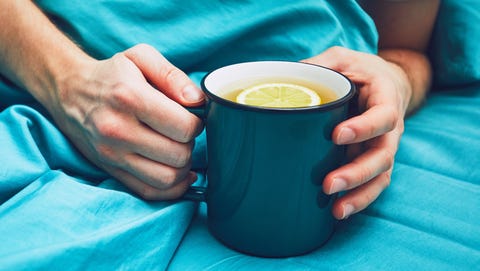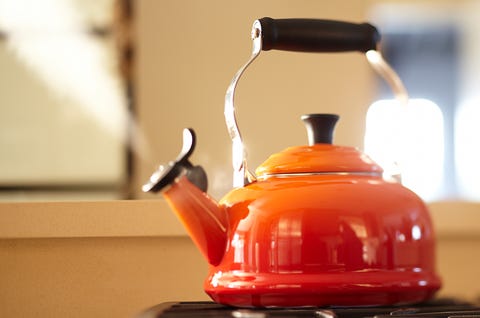Even though most people will deal with aches and pains, stuffy noses, and sore throats a couple of times during the colder months, there still isn’t a cure for the common cold.
Why? More than 200 viruses are responsible for the one billion colds Americans deal with each year , hindering most scientists’ ability to concoct a magic solution that will work against them all. It’s clear that antibiotics—which are highly effective at knocking out bacterial infections—are useless against colds, which are caused by viruses. So most people try to ride it out and hope the sniffles will disappear in a week or so.
It’s true: sometimes you just have to let a cold run its course—but there’s much more you can do to ease your way through the symptoms more comfortably and quickly, doctors say. Ready to get out of bed? Here are 26 ways to get rid of a cold fast.
See if vitamin C works for you
“Vitamin C works in the body as a scavenger, picking up all sorts of trash—including virus trash,” according to Keith W. Sehnert, MD, author of How to Be Your Own Doctor…Sometimes. Vitamin C may also cut back on coughing, sneezing, and other symptoms, although scientific studies produce mixed results when the vitamin is put to the test. One review of research concluded that vitamin C doesn’t really prevent colds, but it did reduce the number of days people experienced cold symptoms by 8 to 9 percent.
If you’re going to take vitamin C, experts recommend that you take 100 to 500 milligrams a day. To help maintain levels of vitamin C throughout the day, take half of the recommended dose in the morning and half at night. (If you’re taking something like Emergen-C, which has 1,000 milligrams of vitamin C, take a quarter of the packet in the morning and a quarter in the evening.)
Zap it with zinc
Studies show that people who sucked on zinc lozenges that contained at least 13.3 milligrams of zinc experienced a significant reduction in the duration of your cold symptoms compared to those who popped a placebo, according to the National Institutes of Health.
This includes things like a sore throat, runny nose, and muscle aches, says Elson Haas, MD, medical director of the Preventive Medical Center of Marin in San Rafael, California. “It doesn’t work for everyone, but when it works, it works,” he says.
While zinc has an unpleasant taste, there are many brands of zinc lozenges available in a variety of flavors. Just remember to check the label, as the amount of zinc varies from brand to brand. Don’t overdo it, either. Taking more than 40 milligrams of zinc a day can cause nausea, dizziness, or vomiting. High doses over an extended period can also hinder your ability to absorb copper, another vital mineral.
🍊Don’t take vitamin C and zinc at the same time. The two bind together, making zinc less effective. Take the vitamin first or wait half an hour after your zinc lozenge has disappeared to take it.
Give grapefruit a go
In the early stages of a cold, try this recipe from Brian Berman, MD, director of the University of Maryland School of Medicine Center for Integrative Medicine and founder of the Institute of Integrative Health: Place a whole unpeeled grapefruit, sectioned into four pieces, in a pot and cover with water; heat to just under a boil. Stir and add a tablespoon of honey, then drink the liquid as you would a tea.
“The simmering releases immune boosters from the grapefruit into the water—vitamin C and flavonoids hidden between the rind and the fruit,” he says. “The concoction packs more punch than store-bought grapefruit juice, plus the warmth eases a sore throat.”
To beef up your body’s healing response, Dr. Berman swears by liquid olive leaf extract, available on Amazon.com and at health food stores. Studies suggest that its antiviral qualities can help treat colds. “You end up getting rid of mucus sooner, and it helps your immune system fight back as well.”
Eat breakfast
Not sure how to start your morning when you don’t even want to get out of bed? Try scrambling up two eggs (for zinc) with 1/2 cup sliced mushrooms (immunity-boosters) and a side of spicy salsa (to ease congestion).
Be positive
Take it easy
“Trying to keep up with your regular routine can be draining, because when you’re not feeling well, your concentration is down, and you’ll probably need to double the amount of time it takes you to do things,” Dr. Caughron says.
…and while you’re at it, be a homebody
When you’re sick, parties and other good times can wear you out physically, compromising your immune system and causing your cold to linger, says Timothy Van Ert, MD, a family physician in Mcminnville, Oregon. Stay home and snuggle up.
Layer up
Take a walk
Go ahead, go outside
Feed your cold
What you feed your immune system may also matter. A study conducted by Simin N. Meydani, DVM, PhD, looked into the effect of taking extra vitamin E (found in almonds, hazelnuts, peanuts, and wheat germ) for colds. Although popping a daily supplement of 200 IU of vitamin E didn’t significantly shorten the duration of colds in the study, the participants who took the supplement had significantly fewer colds than those who didn’t take vitamin E.
Load up on liquids
Use an antihistamine if you can’t stop sneezing
Take an antihistamine, which blocks your body’s release of histamine, a chemical that causes your watery eyes, runny nose, and sneezing. Look for products, like Chlor-Trimeton, which are available over-the-counter, advises Diane Casdorph, BS, PharmD, a clinical assistant professor in the department of clinical pharmacy at West Virginia University School of Pharmacy in Morgantown.
Warning: Antihistamines frequently cause drowsiness, so save these for bedtime or for when you won’t be driving or doing anything that requires quick reactions. If drowsiness is a problem, make sure to go for a nondrowsy formula like Claritin(just have it approved by your doc first), or talk to your doctor about options that are available by prescription.
Stop smoking
Smoking aggravates a throat that may already feel irritated from a cold, says Dr. Caughron. It also interferes with the infection-fighting activity of cilia, the microscopic “fingers” that sweep bacteria out of your lungs and throat. So if you can’t kick the habit for good (it’s never too late!), at least try to avoid it while you have a cold.
Unstuff your nose with a decongestant
First, check your medicine cabinet and make sure you aren’t taking an old product that contains phenylpropanolamine, which was voluntarily withdrawn by manufacturers when the FDA warned that it was associated with an increased risk of stroke, especially in women.
Products currently on the market that do not contain phenylpropanolamine include Sudafed, Actifed, Dristan, and Contac. Before taking a nonprescription decongestant, discuss it with your doctor or pharmacist. Nasal sprays and drops, such as Afrin and Neo-Synephrine, are also effective decongestants. You shouldn’t use them for longer than three days, says Kenneth Peters, MD, medical director of the Northern California Headache Clinic. Overuse can result in a rebound effect, meaning your nose becomes more congested than ever, requiring more medication.
Gargle with salt
Gargle morning, noon, and night—or whenever it hurts most—with salt water, Dr. Van Ert says. Fill an 8-ounce glass with warm water and mix in 1 teaspoon of salt. The salt water will help soothe your sore throat.
Sip a hot toddy
Drink tea at bedtime
Soothe your throat with licorice root
Licorice root tea has an anesthetizing effect that calms irritated throats and relieves coughs, says Dr. Van Ert. Although licorice root is available in tea bags (which works great if you’re short on time—we like this one from Traditional Medicinals), he prefers making his own. Just put the root in a nonmetallic tea ball and steep in hot water for the desired amount of time. Drink it daily. (Check out five more teas for your sore throat.)
Breathe in some steam
You can also boil a pot of water, let it cool for about 1 minute, and then mix in a teaspoon of medicated VapoRub, suggests Woodson Merrell, MD, author of The Detox Prescription. Lean over it with your head about a foot from the steam. Again, make a tent over your head with a towel, and inhale for 5 minutes.
Another idea: Put a few drops of eucalyptus oil in a hot, running shower and inhale the steam as it accumulates, says Benjamin Kligler, MD, an associate professor at Albert Einstein College of Medicine. (Note: The room may be too hot for children.) You may also find comfort using a humidifier close to your bed at night, adds Dr. Van Ert.
Rinse out your nose
Andy Spooner, MD, chief medical information officer at Cincinnati Children’s Hospital Medical Center, says his two children willingly “hose their nose” when they’re sick by squirting the solution up each nostril with a bulb syringe. “Buy saline by the case, and start your kids early. It provides instant relief of congestion without side effects,” he adds. “It won’t shorten your cold, but being able to breathe through your nose makes the wait more pleasant.”
Load up on cough drops and syrups
Look for a product that contains cough-suppressing antitussives such as dextromethorphan, says Casdorph. These include Vicks cough drops and Robitussin DM cough syrup, which also contains an expectorant to loosen phlegm.
Lozenges can also combat coughs. Many of them contain topical anesthetics that slightly numb your sore throat, says Dr. Van Ert, which relieves your need to cough. Sucrets, Cepacol, and Cepastat sore throat decongestant lozenges are among them.
Menthol or camphor rubs have a soothing, cooling effect and may relieve congestion and help you breathe more easily, especially at bedtime. Apply Vicks VapoRub or a similar product to your bare chest, cover up, and get a good night’s sleep, recommends Dr. Van Ert.
Relieve a nose raw from blowing by using a cotton swab to dab on a lubricating layer of petroleum jelly (like this one from Vaseline) around and slightly inside your nostrils, suggests Dr. Peters.
Choose chicken soup
Medicate at night
These combination drugs, however, can have many uncomfortable side effects, such as nausea and drowsiness, says Dr. Van Ert. “I recommend taking these at night since you won’t feel the side effects while you’re sleeping.“ If you need to be on medications during the day, he suggests using those that treat just the symptoms you’re experiencing. Be sure to follow the instructions carefully, he advises.
Ease aches with aspirin or acetaminophen
Both of these options can help ease pain, but don’t overdo it, says the Food and Drug Administration. The absolute maximum limit for acetaminophen is 4,000 milligrams each day (although you can start much lower, depending on the instructions of your medication). The same limit goes for aspirin. If you’re unclear about how much to take, consult with your pharmacist first.
When should you call your doctor about your cold?
If your cold is accompanied by one or more of the following symptoms, see your doctor. Your problem may be more serious than the common cold.
- A fever that remains above 101°F for more than three days, or any fever above 103°F
- Any hot, extreme pain, such as an earache, swollen tonsils, sinus pain, or aching lungs or chest
- Excessive amounts of phlegm, or phlegm that is greenish or bloody
- Extreme difficulty swallowing
- Excessive loss of appetite
- Wheezing
- Shortness of breath




































